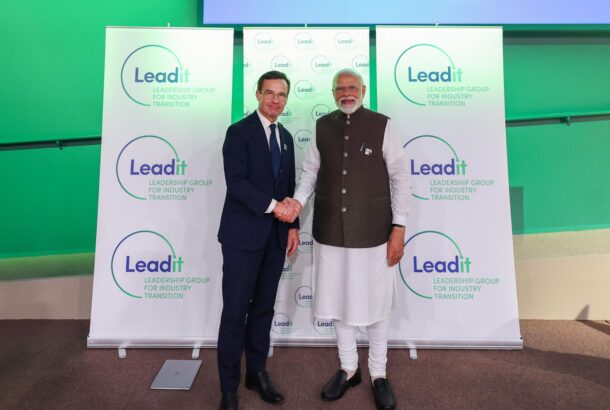Our vision and mission.
Our Vision
Align industry with the Paris Agreement by 2030 to reach net-zero carbon emissions by 2050
Our Mission
LeadIT was launched by Sweden and India at the UN Climate Action Summit in 2019. It was the first global high level initiative aimed at reaching net zero emissions from heavy industry. Originally established to build momentum in industries considered “impossible to abate” it has made considerable progress since 2019 and at COP28 in Dubai in 2023 a new phase of LeadIT was launched.
A joint Mission Statement for the next phase of LeadIT (2024-2026), LeadIT 2.0 was adopted at the annual LeadIT Summit at COP28.
Our mission is to drive the development of an inclusive, just and equitable industry transition by:
- fostering public-private partnerships;
- mobilising resources; and,
- supporting knowledge-sharing.
Read the joint Mission Statement in full here.

Indian Prime Minister Modi (right) and Swedish Prime Minister Kristersson (left) at the launch of LeadIT 2.0
“We have decided to collaborate to strengthen relevant institutions and policy frameworks to co-develop technology, to collaborate on research and innovation, and to mobilize investments in the transition”.
ULF KRISTERSSON, PRIME MINISTER OF SWEDEN
“A new chapter is beginning with the launch of LeadIT 2.0. I believe, together we will be successful in writing a new green growth story for the future generation.”
NARENDRA MODI, PRIME MINISTER OF INDIA
The work of LeadIT 2.0 is organised according to three pillars
Pillar 1: Global forum for just & equitable industry transition
Providing secure spaces for dialogue between governments and industry, while equipping LeadIT members with insights and know—how
Pillar 2: Technology transfer & co-development
Facilitating the formation of business-to-business collaboration to transfer and co-develop clean technologies.
Pillar 3: Industry transition partnerships
Establishing country partnerships that support emerging economies wishing to accelerate their industry transition through co-ordinated multilateral technical and financial assistance. LeadIT currently supports the India Sweden Industry Transition Partnership and the Brazil – UK Industry Decarbonization Hub
A successful transition for hard-to-abate sectors requires:
- A level playing field globally
- Finance for implementation
- Accountability across value chains
- Low-carbon technology diffusion and scale-up
- Enabling infrastructure
To accelerate this, we foster collaboration between decision-makers in the public and private sector to enable the needed policy environment, finance flows, and exchange of best practice by:
- Convening and participating in high-level dialogues to set the international agenda to align on actions for net-zero
- Holding regular meetings between private and public decarbonization experts
- Support roadmapping processes with science-based tools and workshops
- Track plans and investments to decarbonize heavy industry sectors
- Carry out analysis that informs policymaking



